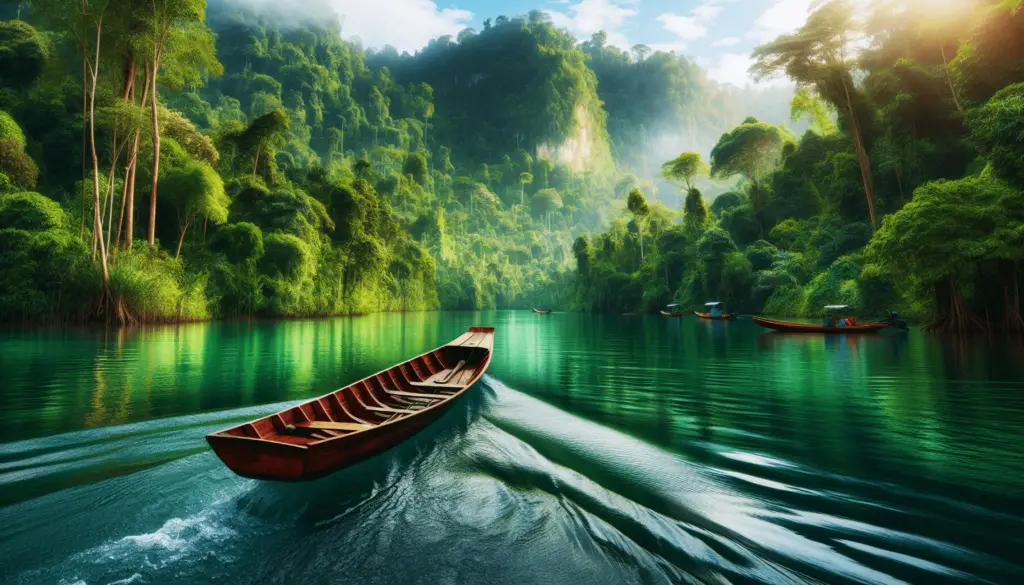You’re about to embark on a journey through the fascinating world of eco-tourism and boating, where conservation and education take center stage. As you navigate this article, you’ll discover how these two seemingly disparate areas intertwine, fostering a deep respect and appreciation for our natural world. You’ll see the remarkable ways in which eco-tourism and boating merge, setting sail towards a future where travel and exploration actively contribute to the preservation and understanding of our planet’s incredible ecosystems. Ready to cast off? Let’s make waves together in this captivating exploration of eco-tourism and boating.

Understanding eco-tourism
Eco-tourism is a form of travel that seeks to provide nature lovers an alternative to traditional tours while having a minimal impact on the environment. But what does it encompass, where did it come from, and what are the guiding principles behind it?
Definition of eco-tourism
You might wonder, what exactly is eco-tourism? At its core, eco-tourism is travel that promotes conservation, has minimal environmental impact, and benefits the well-being of local people. It goes beyond merely exploring natural areas. It involves interpretive and participatory nature-based learning and aims to instill an appreciation for nature, culture, and heritage.
Origin and evolution of eco-tourism
Though people have always held a fascination for remote and wild places, eco-tourism as we understand it today only emerged as a phenomenon in the 1980s. It came as a response to the devastating effects of mass tourism on ecosystems and local cultures. Over time, it has evolved from a niche form of alternative tourism into a comprehensive approach spanning various sectors and regions.
Major principles of eco-tourism
Some key principles guide eco-tourism. First, it must minimize physical, social, and psychological impacts on the environment. Second, it should build environmental awareness and respect. Third, it should provide positive experiences for both visitors and hosts. Also, it should deliver direct financial benefits for conservation and empower local people. Other principles include raising sensitivity towards host country’s political, environmental, and social climate and supporting international human rights and labor agreements.
Role of boating in eco-tourism
While eco-tourism spans a vast range of activities, boating plays an often overlooked yet crucial role. This section will delve into eco-friendly boating practices, the importance of boating in eco-tourism, and popular destinations for such adventures.
Eco-friendly boating practices
The essence of eco-tourism lies in its sustainable practices, and boating is no exception. They range from using less toxic boat cleaners and materials, reducing fuel consumption, preventing pollution, managing waste, and protecting wildlife to educating others regarding environmental concerns.
Importance of boating in eco-tourism
Boating offers a unique way to access remote wilderness areas, observe wildlife, and explore marine ecosystems. It provides a meaningful connection with nature, fosters respect for the environment, and inspires a sense of stewardship. Thus, it plays a vital role in eco-tourism.
Popular eco-tourism destinations involving boating
From the wildlife-rich waters of the Galapagos Islands to the secluded coves of Croatia’s Adriatic coast, there are myriads of boating eco-tourism destinations worldwide. Others include the St John’s River in Florida, known for its impressive manatee sightings, or the fjords of Norway, offering a glimpse of the majestic fjords and rich marine life.
Impacts of eco-tourism and boating on conservation
Eco-tourism and boating, if done right, can greatly assist conservation efforts. However, they can also pose risks to the natural ecology. Understanding this duality is essential to mitigate negative impacts and enhance the benefits.
Positive impacts on the environment
One of the primary benefits of eco-tourism and boating is their potential to contribute to conservation. Profits from eco-tourism and boating can fund preservation efforts. Additionally, eco-tourism promotes an appreciation for wildlife and natural habitats, often leading to an increased impetus to protect these resources.
Risks to the natural ecology
However, not all effects are positive—eco-tourism and boating might pose risks to natural ecology. Irresponsible practices can disrupt wildlife, degrade ecosystems, and pollute waterways. Over-visitation can lead to habitat destruction or alien species’ inadvertent introduction that might disrupt local ecosystems.
Case studies highlighting the beneficial influence
Several case studies highlight eco-tourism and boating’s beneficial influence on conservation. For instance, some eco-tourism companies in Kenya contribute a portion of their profits to community-conducted wildlife conservation. Similarly, in Costa Rica, eco-tourism has been a significant role player in reducing deforestation and conserving biodiversity.
Influence of eco-tourism on education
Perhaps one of the most remarkable aspects of eco-tourism and boating is their enormous potential for education.
Educational opportunities presented by eco-tourism
By nature, eco-tourism is an experiential and transformative form of learning. It offers unique, hands-on educational experiences, from understanding an ecosystem’s intricacies to interacting with diverse cultures or learning about local conservation projects.
Role of boating in outdoor education
Boating, in particular, is an effective tool in outdoor education. Being on water offers a unique perspective on the landscape, encouraging travelers to see the environment from a different angle. This process can also include learning practical navigating skills, understanding marine conservation, or simply fostering a love for the great outdoors.
Examples of eco-tourism’s impact on environmental education
There are countless examples of how eco-tourism aids environmental education. In the Galápagos Islands, for example, naturalist tours educate visitors about local conservation efforts, environmental challenges, and the unique qualities of the archipelago’s flora and fauna. In Alaska, kayak ecotours help individuals understand and appreciate the state’s marine and coastal ecosystems.

Interplay between eco-tourism and community development
Eco-tourism isn’t just about wildlife and wilderness; it’s also about people. It can play a significant role in fostering employment, strengthening community identity, and promoting local pride and conservation responsibility.
Potential for employment and economic growth
One of eco-tourism’s most tangible benefits lies in its potential for promoting local employment and economy. It can provide jobs and income for communities, often in areas where economic opportunities are otherwise limited.
Strengthening community identity and cultural preservation
Furthermore, eco-tourism can strengthen community identity. Celebrating traditional practices, crafts, or rituals can renew their relevance and increase their value within the local culture. This sense of pride can also stimulate efforts for cultural preservation.
Promoting local pride and increased responsibility for conservation
Moreover, the economic benefits from eco-tourism often foster a sense of ownership over local resources, leading to increased responsibility for conservation. It transforms local communities from passive observers to active protectors of their environment.
Sustainable boating practices
Just as eco-tourism entails responsible practices, so does boating. Some of these practices involve using cleaner fuels, adopting eco-friendly boating equipment, and maintaining boats sustainably.
Use of cleaner fuels and renewable energy sources
One key eco-friendly boating practice is using cleaner fuels, such as biodiesel, and employing renewable energy sources like solar or wind power. These actions reduce the ecological footprint of boating and make it more sustainable.
Eco-friendly boating equipment
Equipping boats with eco-friendly gear is another important sustainable boating practice. Some examples include switching to LED lights for energy efficiency, installing water filters to prevent grey and black water pollution, or opting for organic, biodegradable cleaners.
Maintenance tips for sustainable boating
For maintaining boats sustainably, it is important to do regular inspections to prevent oil and fuel leaks. Also, using non-toxic, water-based paints and sealants, cleaning regularly to prevent the transport of invasive species, and disposing of old gear responsibly are other good practices.
Eco-tourism and boating policies
Now, to effectively implement and reinforce the practices of eco-tourism and sustainable boating, having sound policies is vital.
Review of current global eco-tourism guidelines
There exist several globally recognized guidelines and standards for eco-tourism, like the ones set by the Global Sustainable Tourism Council or the International Ecotourism Society. These provide frameworks for ensuring that eco-tourism is truly benefiting conservation and local communities.
Policy improvements to promote sustainable boating
In terms of boating, some policies could be improved. These might include stricter regulations to reduce discharges from boats, incentives for people to use clean fuels, or guidelines for operating boats in sensitive areas to reduce possible disturbance to wildlife.
Role of Government and NGOs
Both government and non-governmental organizations play critical roles in eco-tourism and boating regulation. Governments can create and enforce regulations and provide funding or financial incentives for responsible practices. NGOs often play watchdog roles, implement conservation and community projects, and advocate for responsible tourism.
Challenges in eco-tourism and boating
While eco-tourism and boating have significant potential, they also present several challenges. Recognizing these difficulties is essential for mitigating their impacts.
Addressing common concerns
Common concerns include the risk of over-visitation, possible cultural disruption, and increased environmental footprint despite good intentions. Also, the concern of ‘greenwashing’, where businesses advertise environmental responsibility without actual commitment or impact, is prevalent.
Critical review of the negative impacts
There are undeniable negative impacts associated with irresponsible eco-tourism and boating practices. These might include damaging habitats, disturbing wildlife, or negatively impacting local traditions and culture. The key lies in admitting and critically addressing these problems.
Possible resolutions for the challenges
To mitigate these challenges, potential solutions could include setting limits on visitor numbers, investing in careful planning and management, adhering to strict sustainability standards, and promoting transparency and honesty in the tourism industry.
Future prospects of eco-tourism and boating
Looking ahead, there are developing trends, opportunities and ongoing research needs in eco-tourism and boating.
Opportunities provided by technology
Technological advancements offer exciting opportunities for eco-tourism and boating, from apps that provide detailed environmental information to advanced boat designs that reduce environmental impacts.
Evolving trends and predictions
The future seems to hold an increased consumer demand for responsible and authentic experiences, boding well for eco-tourism. Boating, too, seems likely to continue evolving with a more sustainable and eco-friendly focus.
Needs for further research
However, more research is needed to fully understand eco-tourism and boating’s environmental and social impacts, further innovation to increase sustainability, and explore new ways to enhance the educational components of these experiences.
Case Studies on eco-tourism and boating
To grasp eco-tourism and boating’s real-world implications, let’s take a look at some case studies.
Spotlight on successful eco-tourism and boating ventures
One successful venture can be found in the Galapagos Islands, where strict regulations limit visitor numbers, regulate boating, and provide funds for conservation. Similarly, in the Florida Everglades, local tour operators have used eco-tourism and boating to turn a once depleted area into a prosperous and protected ecosystem.
Lessons learned from past mistakes
We can also learn from past mistakes, such as the degradation of Thailand’s Maya Bay due to unchecked tourism or the spread of invasive species in the Great Lakes due to careless boating practices. These instances serve as stark reminders of the impacts of irresponsible tourism and the importance of careful regulation and management.
Visions for future eco-tourism and boating projects
For the future, visions for eco-tourism and boating combine sustainability, education, community involvement, and careful management. This vision can be actualized in diverse forms in different contexts, continually promoting conservation and education. Eco-tourism and boating show that it’s possible to explore the world responsibly, leaving a positive impact on the places one visits. All it takes is a commitment to conservation, an understanding of local cultures and environments, and a willingness to learn and adapt.

